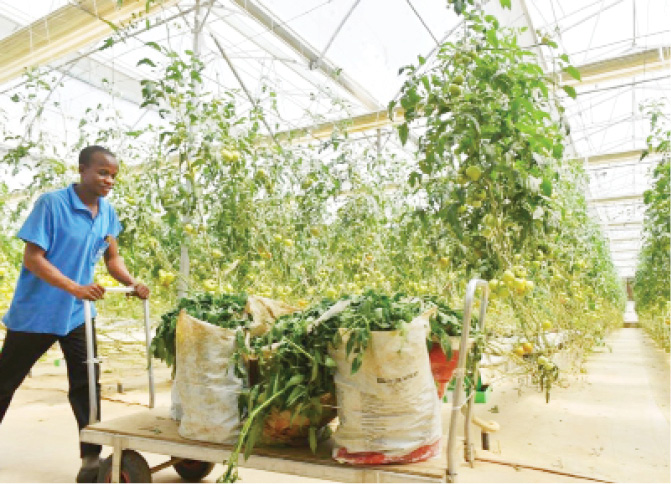The Malam Alu Agro Allied Company, a farm sitting on a 100-hectare land in Faru village, along Maiduguri road, Birnin Kudu Local Government Area of Jigawa State, is changing the perception of mechanised farming in Nigeria, Mansur Da’u Aliyu, the company’s Group General Manager (GGM) said.
The establishment of the farm almost five years ago, it was gathered, was a direct response to the call by the President Muhammadu Buhari-led administration for Nigerians to return to agriculture as the mainstay of the nation’s economy, rather than relying solely on oil as the only source of revenue for the country.

The company’s founder, Farouk Adamu Aliyu, a former member of the House of Representatives keyed into this, the GGM added.
“We do greenhouse farming. We have a 10,000 square-metre fully automated soilless greenhouse, where we produce tomatoes.
We also have two 250 square-metre greenhouses where we produce other greenhouse vegetables, and another 500 square-metre greenhouse, which is being used as a nursery.
These greenhouses are all foreign-oriented, which have been installed to produce a variety of vegetables. We produce only tomatoes from the 10,000 square automated soilless greenhouses; and we produce an average of 10 to 11 tons of tomatoes every week. We also have another 10,000 square-metre locally fabricated greenhouse. We also have a livestock section, where we have about 300 herds of cattle, some camels, goats and sheep,” he said.
Daily Trust gathered that the farm also has a fishery unit, with about 50,000 fishes inside the pond.
Similarly, a forty-ton per hour fertilizer blending plant installed earlier in the year, it was gathered, now produces close to 300 loads of NPK fertilizer under the Presidential Fertilizer Initiative.
“We have also imported equipment for the installation of 120,000 capacity poultry system. We hope to be producing between 3,000-4,000 crates of eggs daily,” Mansur said.
The farm, he said, also has a diary production plant, which is for the production of about 2,000 litres of milk a day, adding that there are also about 150-200 hectares of land elsewhere meant for open field farming for real cultivation of rice and other crops.
Mansur disclosed that the major clientele for the tomato are premium customers, notably big hotels in Abuja, Lagos, and some other locations. He confirmed, however, that the main market for the products was mainly in the eastern part of the country, such as Enugu, Onitsha, Owerri.
He admitted, however, that besides the few customers they have in Kano, their tomato products are rarely seen in the local markets for some reason. First is the fact that the tomato produced from the farm is of special species and the second reason is the fact that Jigawa is a major tomato-producing area.
“You know that tomato is a common product around here, so our price is a little higher than what is obtained normally in the open market. So, essentially, people don’t actually look at us, they feel apprehensive of what we have because they believe they are expensive. And when you have a product that is commonly available, people will surely go for the cheaper brand.”

Asked of the average lifespan of their tomato products, he said, “If you give the tomato all it requires, I mean nutritional supplements you feed it with while it is growing, if you give it all those things, this tomato could last up to three weeks post-harvest. But even without that, it lasts for a minimum of a week, not under any refrigeration, but surely not under intense pressure and heat.You can keep it on the table where you have good ventilation. It can last an average of 10 days, but with everything provided as required (all nutrients) it could last up to one month. This we have experimented, but then, you don’t get it as you always want it.”
The farm is also a source of employment for as many as 200 people in the village where it is located.
He also said the company got some people to train the youth in the area on information technology skills.
He further said most of the equipment used on the farm were imported from Turkey, except the fertilizer-blending machine, which was imported from China.
“Even the farming method is modeled after the Turkish style of operation because we have a Turkish partner that is helping in maintaining the standards,’’ he said, but quickly added that the company was conscious of the need to have Nigerians run the technical aspect of its operations.
Reflecting on the effect of COVID-19 on the operations of the company, Mansur said, Malam Alu, just like other corporate entities in the country, suffered from the devastating effects of the virus.
For Mansur, youths in Nigeria have no excuse to remain unemployed with the opportunity provided by agriculture, noting that those hoping to secure a white-collar job should adjust to the reality and go back to agriculture.
He believes Nigeria is now doing what it ought to have done a long time ago, noting that if the country had taken this step, the current economic crisis would have been averted.

 Join Daily Trust WhatsApp Community For Quick Access To News and Happenings Around You.
Join Daily Trust WhatsApp Community For Quick Access To News and Happenings Around You.


